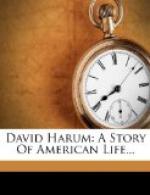“I have sometimes suspected it,” said John, laughing. “He once told me rather an amusing thing about a young woman’s running off with one of his horses.”
“Did he tell you that? Really? I wonder what you must have thought of me?”
“Something of what Mr. Harum did, I fancy,” said John.
“What was that?”
“Pardon me,” was the reply, “but I have been snubbed once this morning.” She gave a little laugh.
“Mr. Harum and I are great ‘neetups,’ as he says. Is ‘neetups’ a nice word?” she asked, looking at her companion.
“I should think so if I were in Mr. Harum’s place,” said John. “It means ‘cronies,’ I believe, in his dictionary.”
They had come to where Freeland Street terminates in the Lake Road, which follows the border of the lake to the north and winds around the foot of it to the south and west.
“Why!” exclaimed Miss Clara, “there comes David. I haven’t seen him this summer.”
They halted and David drew up, winding the reins about the whipstock and pulling off his buckskin glove.
“How do you do, Mr. Harum?” said the girl, putting her hand in his.
“How air ye, Miss Claricy? Glad to see ye agin,” he said. “I’m settin’ up a little ev’ry day now, an’ you don’t look as if you was off your feed much, eh?”
“No,” she replied, laughing, “I’m in what you call pretty fair condition, I think.”
“Wa’al, I reckon,” he said, looking at her smiling face with the frankest admiration. “Guess you come out a little finer ev’ry season, don’t ye? Hard work to keep ye out o’ the ‘free-fer-all’ class, I guess. How’s all the folks?”
“Nicely, thanks,” she replied.
“That’s right,” said David.
“How is Mrs. Bixbee?” she inquired.
“Wa’al,” said David with a grin, “I ben a little down in the mouth lately ‘bout Polly—seems to be fallin’ away some—don’t weigh much more ’n I do, I guess;” but Miss Clara only laughed at this gloomy report.
“How is my horse Kirby?” she asked.
“Wa’al, the ole bag-o’-bones is breathin’ yet,” said David, chuckling, “but he’s putty well wore out—has to lean up agin the shed to whicker. Guess I’ll have to sell ye another putty soon now. Still, what the’ is left of him ’s ’s good ’s ever ‘t will be, an’ I’ll send him up in the mornin’.” He looked from Miss Clara to John, whose salutation he had acknowledged with the briefest of nods.
“How’d you ketch him?” he asked, indicating our friend with a motion of his head. “Had to go after him with a four-quart measure, didn’t ye? or did he let ye corner him?”
“Mr. Euston caught him for me,” she said, laughing, but coloring perceptibly, while John’s face grew very red. “I think I will run on and join my sister, and Mr. Lenox can drive home with you. Good bye, Mr. Harum. I shall be glad to have Kirby whenever it is convenient. We shall be glad to see you at Lakelawn,” she said to John cordially, “whenever you can come;” and taking her prayer book and hymnal from him, she sped away.




